- Home
- Anthony Burgess
Earthly Powers Page 11
Earthly Powers Read online
Page 11
"I'm still thinking about it, Phil. I'm not sure whether it's the sort of thing I can do. I can see that that kind of part would be right, of course--" It would, too; Phil could make a very moving, complex and unusual William Pitt. He had something of the look of Pitt in the Gillray cartoon, where he and Boney are carving the pudding of the world. "There's the question too of not offending the French," I said.
"The war will be over next spring," Phil said. "We'll be able to offend the French all we want to, mean-souled bastards that they are. A spring opening, think, the first big play of the peace: patriotic, comic, tragic. 'England has saved herself by her exertions.'" He made a kind of Pitt arise out of that line; people began looking at him. I was aware, and was uneasy about it, that Val was doing a lot of talking and Hortense was doing a lot of talking, while Linda listened, smiling. She turned, caught my eye, then did not smile. I didn't like this. Phil went on about good plain straight John Drinkwater dialogue without prithee and egad and who could play Fox and who George III till the bell went.
I said, "This your first visit to this?"
"Yes. Awful tripe, as you'll be the first to admit, old lad, but who can blame you? We all have to eat, if you can call it eating these days. Linda's first too, did you know? Had to drag her here practically. Things not going so well in that household, but you know better than I, I should imagine. Well, we'll give it another couple of weary gags or so and then I'll take her to supper." He nodded pleasantly and went to collect Linda. Val left, waving sadly at me. I took Hortense in.
After the performance, back at the apartment, I gave Hortense a large cup of hot strong milky cocoa. She was overexcited, she would not sleep without some such nursery nightcap. I had picked up the last mail delivery of the evening from the table downstairs. "Here's news," I said, while she sipped shoeless on the striped couch, feet tucked under her. "My agent says that Bourreau wants to do it in Paris. As a typical piece of English farce."
"That means a lot more money," she said.
"Dearest Hortense," I said, putting the letter down, "I realize I've been very selfish and neglectful. All I gave you for your birthday last year was a book. For Christmas too. And the books didn't even cost me anything. Tomorrow we must go out and buy really magnificent presents for you. And for Father and Mother as well. And Tom. But what would you like?"
"Not the way you give presents, that," she said. "Presents are meant to be surprises. Nice surprises." And then: "Why did Mrs. Whatsit seem nastily surprised tonight?"
"Selkirk? Linda Selkirk? How? What about?"
"Well, you know one babbles things out when one's nervous, I mean Mrs. Whatsit is a bit overwhelming, blue eyes and raven hair, very unusual that, and I was being complimentary about her husband's acting and the stiff walk was funny but tragic really. She said it was an artificial leg and I said I knew and I'd seen his spare one and... There was nothing wrong in saying that, I thought, but she went all white. Why? And that poet boy, I'm sure he's consumptive, trying to be like Keats I suppose, laughed in a very strange way. He said better to wake up to that than to onions. What did he mean? Was he trying to be modern like Sister Anastasia's favorite poet? You know, the one who has smells of steaks in passageways--"
I too had, I knew, gone white. I tried to breathe easily. Hortense's eyes, too bright for this time of night, grew wider.
She said, "Oh golly, oh saints in heaven, it's not possible, is it?"
"What, Hortense? What is not possible?"
"The Cafe Royal, Oscar and Bosie, oh my dear Lord, are you one of those?"
"One of what, Hortense?"
"You know, you know. So this boy deserted you because you had no money, and now you're making money, and he said it was all his fault you turning from great literature and writing muck for the stage. Oh my dear dear Lord in heaven, it all fits in."
"You," I said carefully, "are having a modern education. Mother and Father--it would never be possible for them to--too late, I mean. If you told them that in prisoner of war camps man and man were driven by sheer necessity but apart from that, there are, and I suppose they're comparatively rare, cases, I mean... what I mean is, your mother knows and is inexpressibly shocked. Father doesn't and, says your mother, mustn't. As for corrupting poor innocent Hortense, she said--"
"Well." She tucked her feet under more comfortably. "It is a bit of a surprise, my own brother, that is. Oh, I'll shut up about it at home, pretend not to know. It happens in schools, I know. Jill Lipton's brother. And with girls. Two of our girls were caught, fourth-formers, immature, inexperienced, it's silly to get caught."
"I've got caught, haven't I?"
She looked at me with adult seriousness. "Not like Oscar. Bosie got away with it, didn't he, being a lord. Oh my dear Lord, you must be careful." And then, with a pose of scientific curiosity which her shining eyes and flushed cheeks belied, "What exactly is it that men do together?"
CHAPTER 17
I lived a celibate life from Christmas till Shrovetide. This was not a matter of caution: what went on behind locked doors was nobody's business but the consenting participants'. But Rodney had already given warning that he would leave the play in the new year, handing over his part to Fred Martins. He had been invited to appear in a sort of trial production of Shaw's Heartbreak House in Manchester, taking what most considered to be the totally unsuitable role of Captain Shotover--a role that nevertheless fascinated him and which he was determined to attempt. Val tried to make a pathetic return into my life, finding his present friend tyrannical and parsimonious, but I was stern in my rejection of his advances. I was far from lonely; I had my work, I had my friends in the theatre.
The new comedy broke, for me, unexpected ground. When I showed the draught first act to J. J. Mannering, he breathed on me his chronic odor of cigars and said, "Lad, it's a musical comedy."
"Never."
"Oh yes. Look--parallel love stories, those people there could be blown up into a chorus, this boozer character is pure rich low comedy. God, even some of these speeches suggest lyrics. Have you ever written lyrics?"
"Well, I wrote poetry at school."
"That's all musical comedy lyrics are, lad--poetry you write at school. Drury Lane, get that into your noddle, big stage, open out, let the thing breathe, dancing, singing, get down to it. Duets, patter songs, choruses. You start with a chorus and end with a chorus. Two acts. Second act in Monte Carlo, Biarritz, somewhere naughty and foreign. Do the lyrics, you know, you know the word, along with the book, let them spring out of the book, you know the word--"
"Pari passu?"
"Knew you'd know the word. Joe Porson's itching for a job. Wasn't his fault Tilly Tulip closed after a month. At least three good numbers in it, he has the gift, Joe, Jerome Kern touch, Irving Berlin, jazzy, we're past that Chu Chin Chow muck. Get down to it, lad."
I was being driven further and further away from literature all the time. You could hardly call this sort of thing literature:
Waking and sleeping,
It's always the same,
Sleeping and waking
I call on your name.
Sleeping I cry,
Waking I sigh,
Knowing there's no reply.
What would Henry James have said? I remembered, or perhaps it is now I remember, walking with him in the autumn garden of Lamb House after the publication of my Socrates novel, him saying, "Keep away from the stony bosom of the theatre, my dear young friend, is the considered advice of one who has suffered the agonies of the damned from the--There is a nakedness, there is a laying on of whips, there is a--" Emotion would not let him get the words out. He shuddered, his mouth opened and shut. He picked up his dachshund Max and clasped him to his unstony bosom as if to protect him too from the theatre. He was, I could tell, remembering the hoots and howls that greeted Guy Domville, himself responding in innocence to the cruel call of "Author," standing there to be ridiculed, his mouth opening and shutting. Oh for the concealing warmth of the novel, the tortuous caverns
of style wherein to hide. Nakedness was right.
The musical comedy was called Say It, Cecil and was based on a very silly idea. A young man named Cecil loves a young girl called Cecilia but cannot bring himself to utter the ultimate endearment. In August 1914 he said I love you to a girl and immediately war broke out. In France he said Je t'aime to a girl and the surrounding village was blasted to smithereens. Somebody taught him to try Ya vas lublu and his brought about the Russian Revolution. Cecilia thinks she loves him but refuses to be sure until she hears him utter the unequivocal formula. He says Ich liebe dich, despite the snarls of the patriotic, and this brings about the collapse of Germany. Great jubilation, but he still dare not say I love you. He has a song with chorus--"What I want to say"--and the chorus sings it for him, but this still will not do. The problem is solved (I blush, I still blush) through a trick involving the names of islands. Isle of Man, Isle of Wight, Isle of Capri, Isle of You. No further disasters. Final reprise of chorus "Oh, say it, Cecil" as "You've said it, Cecil." Is it possible for the reader to imagine anything stupider? I was haunted throughout the writing by an image of the great stone head of Henry James, unmoved, unmoving, eye and brow all eternal reproach.
I finished the final chorus on Sunday, February 24:
We're versing and voicing
Our heartfelt rejoicing,
Your troubles belong to the past.
So nuzzle and nestle,
For you've said it, Cecil,
At last.
Curtain. The shame, the salivation at the prospect of more money.
There was a knock at the door.
"Rodney, dearest. Such a lovely lovely surprise."
Kiss. "Angel, it's seemed like a long time." He put down his bag.
"But why the diffident knock?"
"No keys. The whole damned bunch of them disappeared just before I went northwards. No matter. Must have a drink, angel. Parched." And he mixed himself Haig and water. Strange to consider that we had no refrigerators in those days. He drank and poured himself more. Then he sat on the striped couch, his artificial leg grotesquely stiff before him. "One of my bad days, angel. The bloody chafing."
"Take it off, Rodney. We shan't be going out, shall we? I managed to get hold of a nice piece of mutton. And capers. And a virtually immaculate cauliflower. We'll have a pleasant dinner." I looked on him with love, neat and compact in his stiff grey suit, humorously ugly, tanned as though he'd been to summer Blackpool, not Manchester. "How was it?"
"Messed up as from Thursday. Dear Mabel, Mrs. Hushabye you know, got a telegram, War Office. Poor bitch, I'd met Frank, nice lad. She did the brave little woman, the show must go on, but she forgot her lines and broke down, nerve-racking. What Manchester thinks today London will think tomorrow. Manchester says pshaw to Shaw. And it wasn't really my part, not my part at all. You writing something for me?" He saw the manuscript on the desk.
"This is singing and dancing. Do take that leg off."
"You? Singing and dancing? Well, I suppose it had to happen. I can sing, as you know, angel. A peglegged dance might bring the house down. But no, I have to get down to Claudius for Bentinck. God, I'm so thirsty." I mixed him a fresh drink. "Had the shivers on the train. Cold early train in the dark of foredawn. A bit feverish. Feel my head."
"Hot. Get nearer the fire. Sweat it out."
He had a bad cold, sure enough. He could eat little dinner. I got him to bed with a hot water bottle and a tumbler of grog. I lay beside him. He threshed, he mumbled his Captain Shotover lines in the night.
"Nothing but the smash of the drunken skipper's ship on the rocks, the splintering of her rotten timbers, the tearing of her rusty plates, the drowning of the crew like rats in a trap."
"Rodney, Rodney dear--"
"The captain is in his bunk, drinking bottled ditch-water, and the crew is gambling in the forecastle. She will strike and sink and split. Do you think the laws of God will be suspended in favor of England because you were born in it?"
He sweated in gushes, soaking the sheets, then woke raging with thirst. I gave him tepid barley water. "Thanks, angel. A bit better, I think. Sweated a lot of it out. God, we'd better do something about this bed." I got him out of his soaked pajamas and made him sit, shivering now, wrapped in the counterpane while I turned the mattress over and fetched fresh sheets. Then, both naked, we got back in and clasped each other, and I soothed his poor aching stump with stroking fingers. So embraced, we finally slept, lullabyed by the first milk floats.
In full winter morning rainlight I dreamed that the bedroom door was open and that there were people standing there. Was I sickening too? No, it was no dream. There were people in the room, three, two men and a woman.
"I see. Filth," said Linda Selkirk in sable coat and sable toque. The two men might have been younger and elder brother, both with glum Old Bill whiskers, in drab herringbone overcoats, one, the elder, with his bowler hat on.
"Get out," I said to them all, pulling my numbed arm from under sleeping Rodney. "You've no right in here. You broke in, I'll have you for trespass." One never says the right things. Linda Selkirk bitterly jingled a keyring from the end of her gloved right index finger. Rodney began to snore to compete with the voices.
She said, "Trespass. A wife has a right to be with her husband. Have you gentlemen," she asked her companions, "seen enough?"
The elder, he with the hat on, said in a Thamesside whine: "There's certain differences, madam. If that gentleman there was a lady--..." pointing at me. "You see the difference, madam. Soldiers sharing a bivouac, that's not adultery."
"What are you two?" I tried to shout. "Police officers? Where's your warrant?"
"Ah, expected police officers, did you?" said the other one. "And why would that be, sir?"
"As for entering without permission," the still-hatted one said, "the lady was frightened of violence. Any citizen has the right to protect. And she has a right to be in here."
"You two look," said Linda, "and remember. Men in bed, their arms round each other, disgusting. He comes straight here, ignoring his wife and children, wallowing in filth."
I nearly said, We changed the sheets. Infection from my trade. I said, "Here you see a sick man." Unfortunately Rodney was now awake, audible licking a parched mouth, looking with wide-eyed hate on his wife. He did not seem surprised at her presence here; he did not seem to see the two whiskered men. "He came here sick. I've spent the entire night looking after him. Your job," I said stupidly to Linda Selkirk.
"He can act sick," she said. "He's acted sick before, just as he's acted love. And don't you tell me what my job is, you filthy sodomite."
"Careful, madam," said the unbowlered.
Rodney was trying to sit up, well-backed by pillows. There we were, two men in bed, clearly naked from the waist up. I grabbed my dressing gown from the bedside chair and, like any spinster, covered my breasts.
"Prothero Agency, eleven Wardour Street," the hatted man said, making the gesture of getting ready to produce a card from an inner pocket. "Witnessing an act of infidelity being the purpose of our business."
"Take that bloody hat off in my house," I cried.
"Yes, sir." And he took it off. He seemed to have dyed his hair some time past; the dye was working out; there were patches of dirty grey and dead black and a residual henna glow. "Madam," he said, "you can lay an evidence. Perhaps you've been told that already."
Rodney now seemed to be acting a well though demented man. "Bitch," he said, "you can go to bloody Kemble as he calls himself. He has two legs and he can shove them both between yours. Leave us alone, we're all right as we are."
"I'll leave you alone," she said, "and I'll make sure you leave the children alone. Have you," she said to the two witnesses, "seen enough?"
"The act's always hard to prove," said the younger. "That's well-known in law. It's all circumstantial."
"You heard that," she said, "from his own filthy mouth. About leaving them together."
"Yes," Rodney
said, getting out of bed. "Get out, go on. You can have Kemble, making a bloody fool of me all over London."
"Discretion of the court," muttered the younger witness. He looked at Rodney getting out of bed naked, lacking a leg. "Ah," he said. The other shook his head sadly, as in pity, as at the hopelessness of our situation, the leglessness being an added perversity. Rodney, hissing "Bitch bitch," hopped two paces, holding on to the bed, ready to spring and hold on to her for support while strangling her. Then he fell and could not get up.
"Do you admit," said Linda to me, "that you're sodomizing my husband, you swine?"
"Not at the moment," I said. The farce had really entered my blood. Then, putting on my dressing gown, I went over to poor Rodney. The dressing gown lacked its belt. I might as well have been naked. I heard one of the men going tut-tut while I got hold of Rodney's artificial leg. The idea perhaps was to strap it on to him and enable him to get over there, naked and legged, to strangle Linda.
Linda said, "I want to be sick. I want to vomit. The filth. Trying to be Oscar Wilde. I'll break you, I'll ruin you both. Jail for both of you, filth. I'll have it all over the newspapers, everything."
"Law of obscenity," muttered the younger.
I grasped the artificial leg like a club and raised it to hit, my dressing gown open, showing all I had. Rodney on the floor groaned and tried to get up. His poor arms were too feeble to take the strain of lifting. He collapsed again. The two witnesses sturdily placed themselves in front of their agency's client as I came forward diffidently. I lowered the leg and seemed to be presenting it as a seller of legs, lovely leg here madam admire the action, as one who offered the leg as a legal defense, blame it all on the war. Linda showed her teeth in disgust.
She said, "You'll hear. You'll be punished. You can keep him." And then: "Can't, can you? You'll be in different cells, they'll send you to different prisons." Then she neatly spat, turned her back, and, went out. She herself, of course, had been a small actress, not successful, abandoning art for marriage. The two men put their hats on, nodded, made tentative hand gestures of goodbye, all in very fair comic synchronization. Then they too went. I followed, seeing them off the premises. They did not look back. I returned to Rodney and got him into bed. He was both burning and shivering and could say nothing but bitch and bloody bitch. I went to the kitchen and made tea. The sad Monday rainlight would not ray down rain; it was a harsh and costive February sky. I made toast and spread real butter, gift of an Irish admirer. I still refused to think. I took in a tray to Rodney. He could eat nothing but drank thirstily of the milk-cooled tea. Then it was my turn to tremble, though with fear.

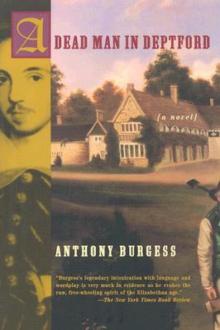 A Dead Man in Deptford
A Dead Man in Deptford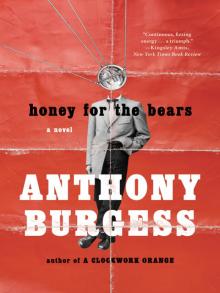 Honey for the Bears
Honey for the Bears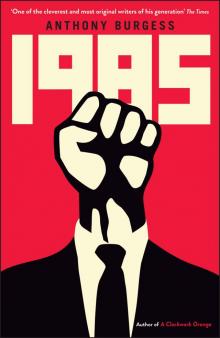 1985
1985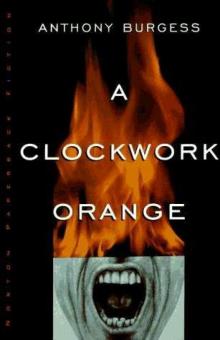 A Clockwork Orange
A Clockwork Orange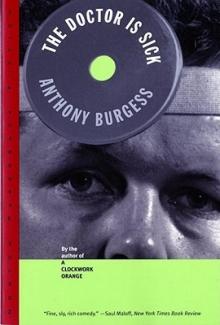 The Doctor Is Sick
The Doctor Is Sick Earthly Powers
Earthly Powers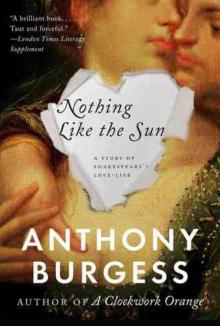 Nothing Like the Sun
Nothing Like the Sun Collected Poems
Collected Poems The Kingdom of the Wicked
The Kingdom of the Wicked The Wanting Seed
The Wanting Seed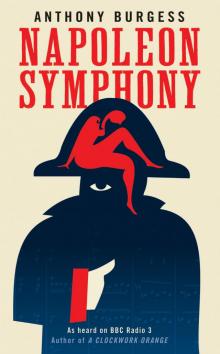 Napoleon Symphony
Napoleon Symphony The Malayan Trilogy
The Malayan Trilogy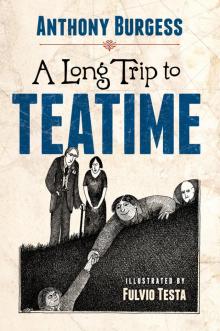 A Long Trip to Teatime
A Long Trip to Teatime Enderby Outside
Enderby Outside M/F
M/F The Complete Enderby
The Complete Enderby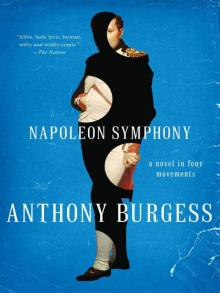 Napoleon Symphony: A Novel in Four Movements
Napoleon Symphony: A Novel in Four Movements Enderby's Dark Lady
Enderby's Dark Lady The Clockwork Testament (Or: Enderby 's End)
The Clockwork Testament (Or: Enderby 's End) ABBA ABBA
ABBA ABBA A Clockwork Orange (UK Version)
A Clockwork Orange (UK Version)